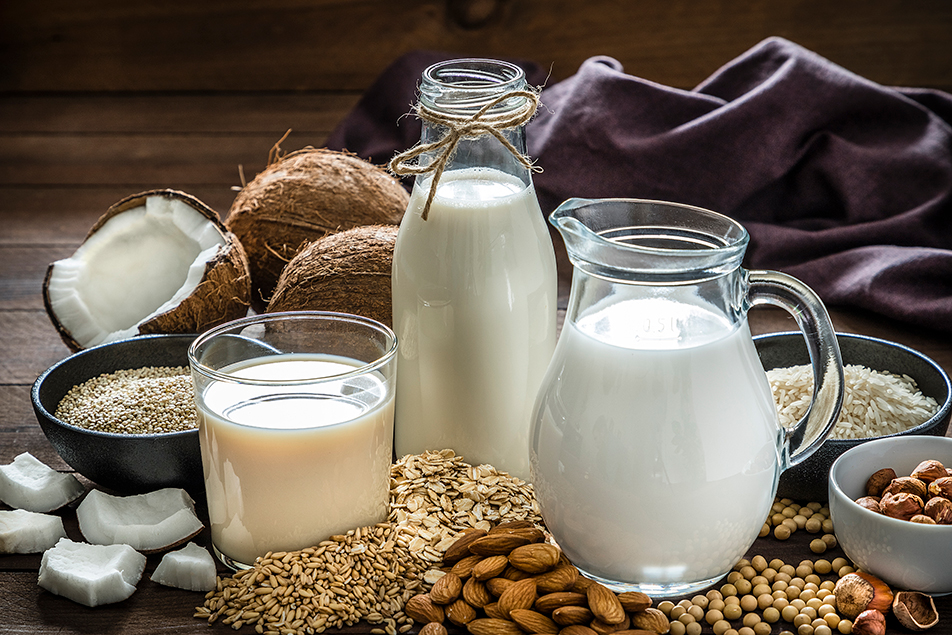
This post was written by Kayleigh Shoaff, RD, Nutrition Services, Parkview Health.
Over the past few years, the milk section of the grocery store has become significantly larger, making room for a variety of options outside of the dairy staple so many of us grew up on. In fact, a large portion of the products on these shelves don’t come from an animal at all. What are all these milk alternatives and are they better for you than regular cow’s milk?
The rise of plant-based milks
The most common alternatives to cow’s milk are plant-based milks. These are “milks” made from various plant products. Popular options include soy, almond, rice, oat, pea, coconut and cashew. These plant-based milks are made using the same basic process. The base material is soaked to make it soft and easy to work with. Next it is ground into a pulp, strained and mixed with water. Then, various ingredients are added, such as emulsifiers, thickeners, flavor, vitamins, minerals and/or sugar. The resulting “milk” is essentially water with a small amount of the plant-based material.
A shift in the market
There are several reasons why someone would choose a plant-based milk alternative over cow’s milk. The most common reason is a milk allergy or an intolerance to dairy. Other people choose these alternatives because they are following a vegan diet, for ethical reasons (concern for animal welfare), sustainability (cows are a known contributor to greenhouse gas emissions) or as a health preference (plant-based milks are generally lower in calories and fat than cow’s milk).
Nutritional merit
To understand the differences between cow’s milk and plant-based alternatives, let’s look at the nutrient profile of cow’s milk first.
Dairy milk is a highly nutritious substance that contains almost every nutrient that your body needs. One serving of whole milk contains at least 13 essential nutrients. Cow’s milk is an excellent source of high-quality protein in the form of whey and casein. Whey protein is helpful for growing and maintaining muscle mass, while casein increases the absorption of calcium and phosphorus. Cow’s milk contains high amounts of vitamin B12, calcium, riboflavin, phosphorus and vitamin D, which is added through fortification. Other important nutrients found in cow’s milk include vitamin A, zinc, selenium, niacin, iodine, potassium, and pantothenic acid. Consumption of cow’s milk helps support bone health, and diets that contain dairy are associated with a lower risk of cardiovascular disease, type 2 diabetes mellitus and high blood pressure.
Despite all the nutritional benefits of cow’s milk, there are still some downsides to its consumption. A huge amount of water and food materials are required to raise cows. It takes 976 gallons of water to create just 1 gallon of milk. Compared to plant-based milks, cow’s milk has a shorter shelf life which may contribute to food waste if the product is not sold or consumed quickly enough. The main sugar found in dairy milk is lactose, a common intolerance. Milk is also a top allergen among babies and children.
While there are upwards of a dozen different varieties of plant-based milks on the market, we’ll focus on the nutrient profiles of the six most popular kinds: almond, soy, rice, coconut, pea and oat.
Almond milk is low in protein and carbohydrates and is generally low in calories (unless it contains added sugars). It is fortified with vitamins and minerals, including vitamin E, which is naturally occurring in almonds.
Soy milk is rich in protein with 7-9 grams of protein per serving and is usually fortified with vitamin D. It contains higher levels of vitamin B12 compared to cow’s milk due to fortification. Soy milk contains isoflavones, which are antioxidants that may be associated with a reduced risk of cardiovascular disease. It is nutritionally the most comparable to cow’s milk in its protein, vitamin A, vitamin D and riboflavin content. Fortified soy milk is the only plant-based milk that is recognized as a suitable substitute for cow’s milk in federal nutrition programs (WIC, SNAP).
Rice milk is full of B vitamins and is low in fat and protein content. It has a higher carbohydrate content compared to other plant-based milks. The calorie content of rice milk varies based on whether it has added sugar. Most rice milks are fortified with calcium, vitamins A, D, and B12 at levels similar to cow’s milk. It’s a good option for people who are susceptible to intolerances or allergies as it’s free of soy, gluten and nuts.
Coconut milk is a light and sweet beverage that is also good for cooking. It is a rich source of calcium and is naturally soy and gluten free. Coconut milk is very low in carbohydrates and protein. While it is low in calories, most calories in coconut milk come from saturated fat.
Pea milk is made with yellow pea protein which is easier to emulsify so less additives are needed to make pea milk. It has a nutrient profile similar to soy milk and some brands are fortified with DHA and up to 100% of the daily value of vitamin B12.
Oat milk is sweet and naturally thick. Like rice milk, it is higher in carbohydrate content. Oat milk contains about 2-3 grams of protein and is fortified with calcium, potassium, vitamin A and vitamin B12.
So, what’s best?
When choosing a plant-based milk alternative, it’s important to keep in mind that these alternatives should not be considered an exact substitute for cow’s milk. Each milk alternative has pros and cons in their nutrient profile. Always be sure to read the label and pay attention to whether your milk alternative is sweetened or has added sugar. Keep in mind the protein content as well, as plant-based alternatives tend to have lower protein amounts than dairy.
Different plant-based milks can satisfy different needs based on someone’s individual goals. It’s best to choose plant-based alternatives that are fortified with vitamins and minerals that would normally be found in cow’s milk. If you have switched to a plant-based milk alternative and have concerns that your diet is lacking in certain nutrients that you would otherwise be getting from dairy milk, reach out to a registered dietitian or your doctor for advice.
Sources
https://foodandnutrition.org/from-the-magazine/a-bevy-of-milk-alternatives/
https://www.webmd.com/diet/what-to-know-about-plant-based-milk
https://www.ncbi.nlm.nih.gov/pmc/articles/PMC5756203/
https://www.healthline.com/nutrition/milk#nutrition



